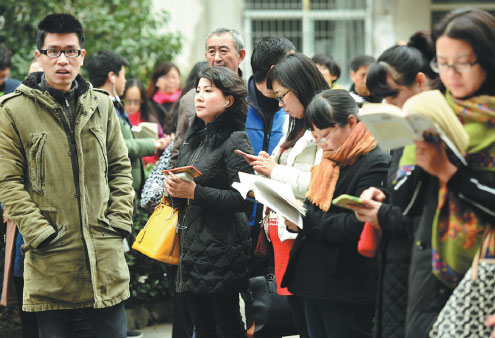Parents wrestle with math problem
By Li Yang | China Daily | Updated: 2019-03-28 09:21

Ban on coaching for international contests challenged
News that China finished in sixth place at the 2019 Romanian Master of Mathematics, an international contest held late last month in Bucharest, the Romanian capital, caused barely a ripple in academic circles.
Neither did the fact that none of the six Chinese contestants won a gold medal at the Olympics-style event.
But China made significant progress in the renowned contest - which to many observers is more difficult than the International Mathematical Olympiad - after finishing 13th in 2013 and 12th in 2016 in Romania.
Still, this year's result was described as an embarrassing defeat by some parents who have questioned the Ministry of Education's ban last year on extracurricular coaching for Olympics-style contests, and even claimed that China has generally fallen behind in mathematics.
The Romanian competition is an annual six-problem mathematical event for students before they attend college. The first contest was held in Bucharest in 1959, and it has since been held annually, except for 1980. More than 100 countries, representing over 90 percent of the global population, send teams of up to six students, plus one team leader, a deputy leader and observers.
Late last year, the ministry's ban on coaching for Olympics-style math competitions was strictly enforced nationwide - in response to calls to ease the academic burden on children. Some parents and nearly all students attending coaching sessions breathed a sigh of relief, as it heralded the end of difficult, and sometimes weird, mathematical problems.
But many parents who think that the ban goes too far still hope their children can continue to receive coaching after school that will lead to them gaining admission to key academic institutions.
In addition to stopping the coaching, the ministry halted all national math contests for primary school students. Some of these contests date to the 1980s.
This, in effect, shut the door for the coaching agencies. Previously, first-prize winners in some of the contests could be enrolled directly by leading junior middle schools without taking enrollment exams.
Despite the ban, there is still an annual national league math competition for high school students in which the first-prize winners are sought by leading universities. Those who make the final 30-strong pool for the national team can directly obtain offers from key universities without sitting the gaokao, the national college entrance exam.
Tian Run, the mother of a second-grade student in Jinan, Shandong province, arranges her daughter's after-school timetable with precision. "I don't think she is sufficiently gifted to make the national team pool, but she needs to learn Olympic math and some other extracurricular courses," she said.
"This helps to develop pupils' intelligence at an early age. Their efforts will pay off some time in the future."
Tian said her daughter, who spends nearly all her time after school and during weekends on extracurricular coaching, ranging from math to piano lessons, enjoys living a full life.
Zhao Le, a father in his mid-40s whose son attends a leading junior middle school in Beijing, said: "Before the ministry's ban, almost all the students in my son's class attended extracurricular coaching in Olympic mathematics, which is a major subject. A child would be an exception if he or she did not receive this extra training."
Zhao, who attaches great importance to his son's education, supports children studying for the IMO as long as their parents can afford it.
























